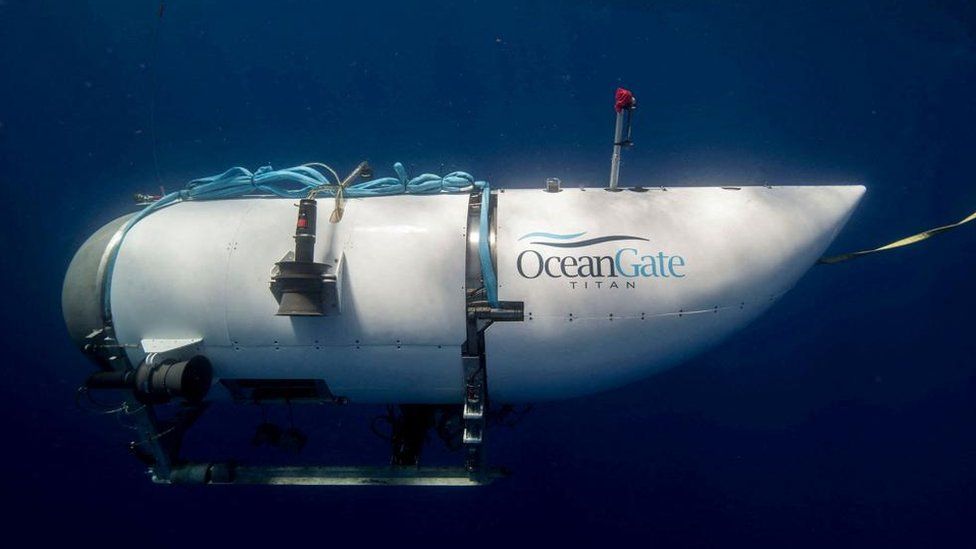
Stockton Rush wanted to be known as an innovator. It didn't seem to matter how he did it.
Bright, driven, born into wealth, his dream was to be the first person to reach Mars.
When he realised that was unlikely to happen in his lifetime, he turned his attentions to the sea.
"I wanted to be Captain Kirk and in our lifetime, the final frontier is the ocean," he told a journalist in 2017.
The ocean promised adventure, adrenaline and mystery. He also believed it promised profits - if he could make a success of the submersible he helped design, which he directed his company OceanGate to build.
He had a maverick spirit that seemed to draw people in, earning him the admiration of his employees, passengers and investors.
"His passion was amazing and I bought into it," said Aaron Newman, who travelled on Mr Rush's Titan sub and eventually became an OceanGate investor.
But Mr Rush's soaring ambition also drew scrutiny from industry experts who warned he was cutting corners, putting innovation ahead of safety and risking potentially catastrophic results.
It wasn't something he was willing to accept.
Last week, he and four other people on board the Titan lost their lives when it imploded.
"You're remembered for the rules you break," Mr Rush once said, quoting US general Douglas MacArthur.
"I've broken some rules," he said about the Titan. "I think I've broken them with logic and good engineering behind me."

Stockton Rush III was born in California in 1962 into a family that made its fortune from oil and shipping.
He was sent to a prestigious boarding school, the Phillips Exeter Academy in New Hampshire, and went on to earn a bachelor's degree in aerospace engineering from Princeton University in 1984.
At 19, he became the youngest pilot in the world to qualify for jet transport rating, the highest pilot rating obtainable. He worked on F-15s and anti-satellite missile programmes, with the hope of eventually joining the US space programme and being an astronaut.
But eventually that ambition lost its appeal, as a trip to the Red Planet seemed increasingly out of reach.
"If someone would tell me what the commercial or military reason to go to Mars is, I would believe it's going to happen," Mr Rush told Fast Company magazine. "It's just a dream."
So he shifted his gaze downward and in 2009 founded OceanGate, a private company that offered customers - Mr Rush preferred the term "adventurers" - a chance to experience deep sea travel, including to the wreck of the Titanic.
The company, based in Everett in Washington state, was small and tight-knit. Rush would chair all-staff meetings at its headquarters, while his wife Wendy - another member of Princeton's class of 1984 - was his director of communications.
A junior employee who worked at OceanGate from 2017 to 2018, and asked not to be identified, said the company headquarters felt homey and lived-in, with wiring and equipment seemingly everywhere. "It was very free-flowing."
At the helm was Mr Rush.
"He was just really passionate about what he was doing and very good at instilling that passion into everybody else that worked there," the employee told the BBC.
At one staff meeting, Mr Rush brought virtual reality goggles for everyone to take a digital underwater tour. Mr Rush told them that this is what they were aiming for - to allow more people to have this view. "This is the world I want," he told them.
Mr Rush was "not a leader from the back, telling people what to do - he led from the front", said Mr Newman, the investor.
Mr Newman went on the Titan with Mr Rush to see the wreck of the Titanic in the summer of 2021.
The first time they met, Mr Rush "spent hours" talking with him about the potential of exploring the bottom of the ocean.
Mr Rush "followed his own path", Mr Newman said.
Mr Newman's recollection of OceanGate was of a team that looked out for each other.
And Mr Rush's wife, Wendy, was "up at the top, looking over his shoulder, making sure that he was doing everything perfectly and not cutting corners or skipping things", he said.
Mr Newman was so taken by Mr Rush that he decided to invest in OceanGate. "You know, I didn't know if I'd ever see any return or not. That was not the point," he said.
"The point was to be part of something that's experimental and is breaking new ground, and pushing forward our technology, and how the world works, and going places and doing amazing things, that's what this is about."
Mr Newman described himself as a minor investor. As a private company, OceanGate is not obliged to publish all financial records. US financial records from January 2020 show that Mr Rush and his fellow directors sold a stake in the company worth $18m, thought to have been used to fund the development of Titan.
To recoup the costs, OceanGate's sub, "well-lit and comfortable," the company said, came with a price tag of $250,000 (£195,600) for a underwater trip.

More coverage

Mr Rush's clients were uber-rich thrill seekers, willing to part with that sum for a once-in-a-lifetime adventure.
Las Vegas businessman Jay Bloom had been messaging Mr Rush about joining a dive, before finally turning down a seat for himself and his son on the fatal excursion.
He said the chance to see the wreck up close would have been a "bucket-list" experience. It was about being able to say "you did something very few people have the opportunity to do", he said.
Despite the large sums of money involved, OceanGate equipment sometimes had a home-made feel.
The former junior employee told the BBC he was surprised to find that Titan's electrical design included off-the-shelf development boards, as opposed to using a custom, in-house design like other engineering companies.
David Pogue, a CBS News journalist who joined Mr Rush on a trip to the Titanic wreck in 2021, said the chief executive drove the Titan with a game controller and used "rusty lead pipes from the construction industry as ballast".
Yet Mr Rush assured Mr Pogue that only thing that really mattered was the vessel's hull, built from an unusual and largely untested material for a deep sea vessel: carbon fibre, with titanium end plates.
Mr Rush knew carbon fibre was used successfully in yachts and aviation, and believed it would allow for his submersible to made more cheaply than industry-standard steels ones.
"There's a rule you don't do that," said Mr Rush in 2021. "Well, I did."
The tube shape of the Titan was also unusual. The hull of a deep-diving sub is usually spherical, which means it receives an equal amount of pressure at every point, but the Titan had a cylinder-shaped cabin. OceanGate gave it sensors to analyse the effects of changing pressure as it descended.
The glass viewport, from which passengers could see out, was only certified down to 1,300m, far short of the depths of the ocean floor where the Titantic wreck lay.
Rob McCallum, an explorer who acted as a consultant for OceanGate, became concerned when Mr Rush decided against getting official certification for the submersible.
Subs can be certified or "classed" by marine organisations, like the American Bureau of Shipping or Lloyd's Register, meaning the vehicle must meet certain standards on things like stability, strength, safety and performance. But this process is not mandatory.
In emails to Mr Rush in March 2018, seen by BBC News, Mr McCallum said: "You are wanting to use a prototype un-classed technology in a very hostile place. As much as I appreciate entrepreneurship and innovation, you are potentially putting an entire industry at risk.
"4,000m down in the mid-Atlantic is not the kind of place you can cut corners."
Mr Rush, apparently indignant, responded that he was "tired of industry players who try to use a safety argument to stop innovation".
Safety was "about culture, not paperwork", he said. He talked of needing "sensible design, extensive testing, and informed consent of the participants", but said a piece of paper did not guarantee the safety of a sub.
While he admitted deviating from some guidelines, such as "overly conservative" viewport limits, he argued the Titan's safety systems were "way beyond" anything else in use.
He wrote: "I know that our engineering focused, innovative approach (as opposed to an existing standards compliance-focused design process) flies in the face of the submersible orthodoxy, but that is the nature of innovation."
The tense exchange ended after OceanGate's lawyers threatened legal action, Mr McCallum said.
This video can not be played
To play this video you need to enable JavaScript in your browser.
But Mr McCallum was not the only person linked to the company to speak out about safety.
Just a few months earlier, former OceanGate employee David Lochridge raised concerns in an inspection report which identified "numerous issues that posed serious safety concerns", including how the hull had been tested.
Also in 2018, the Marine Technology Society sent a letter to OceanGate accusing it of making misleading claims about its design exceeding established industry safety standards, and warned that OceanGate's "experimental" approach could result in "negative outcomes (from minor to catastrophic)".
In a blog post in 2019, Mr Rush insisted that the majority of marine accidents were down to operator error. He said OceanGate took safety requirements very seriously, but that keeping an outside body informed on every modification before it was tested in a real-word setting was "anathema to rapid innovation".
The former employee told the BBC that while he had worked at OceanGate, he had felt confident in Mr Rush's commitment to safety.
"Rush was very level-headed, he knew what needed to be done," he said. "He went on every sub dive, he was the pilot for every single one, and that's because he trusted the safety of the sub."
Mr Newman told the BBC the sub might not have been certified, but it was tested extensively. Mr Rush "introduced new ideas and new pieces that are not conventional, and some people don't like that", he said.
"The idea that this is something that's unique and Stockton did something wrong is disingenuous," he said.
Mr Rush himself told CBS reporter Mr Pogue last year that "if you just want to be safe, don't get out of bed".
"Don't get in your car. Don't do anything. At some point, you're going to take some risk, and it really is a risk-reward question. I think I can do this just as safely by breaking the rules," he said.
The question is why despite other successful dives, the sub's final trip ended in tragedy, Mr Newman said.
"Clearly, the pressure hull gave way, right? And the question is, why would that give way?"
Guillermo Söhnlein, a co-founder of OceanGate and Rush's former business partner, said he would not have taken a different approach himself.
"The human submersible community globally is very small, and we all know each other, and I think generally we all respect each other's opinions.
"The bottom line is that everyone's got different opinions on how subs should be designed," said Mr Söhnlein.
After his son also raised fears about the sub, Jay Bloom declined Mr Rush's invitation.
"I am sure he really believed what he was saying," Mr Bloom said. "But he was very wrong.
Additional reporting by Michelle Fleury and Nathalie Jimenez
Related Topics
https://news.google.com/rss/articles/CBMiMWh0dHBzOi8vd3d3LmJiYy5jb20vbmV3cy93b3JsZC11cy1jYW5hZGEtNjYwMTQ1NjXSATVodHRwczovL3d3dy5iYmMuY29tL25ld3Mvd29ybGQtdXMtY2FuYWRhLTY2MDE0NTY1LmFtcA?oc=5
2023-06-25 15:38:13Z
2174318350
Tidak ada komentar:
Posting Komentar